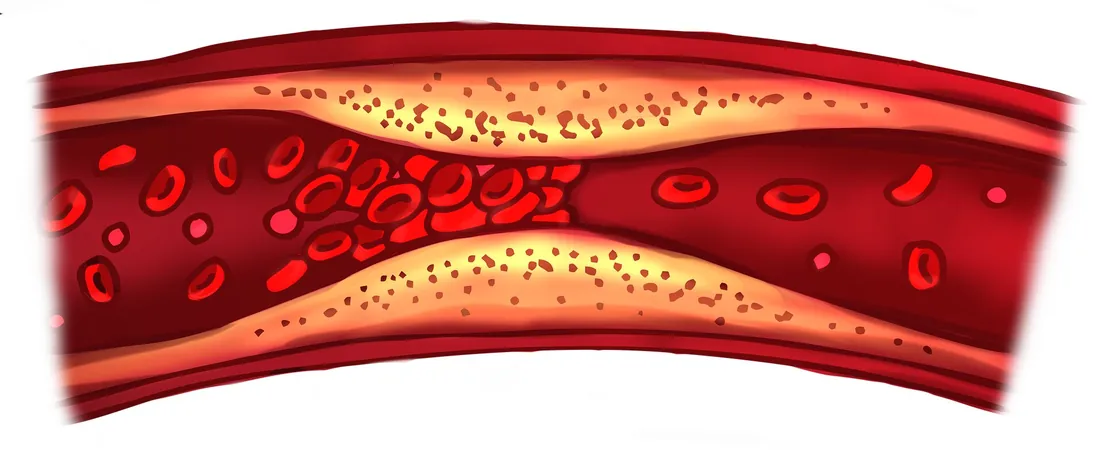
Revolutionary Combo Therapy Could Slash Cardiovascular Deaths - New Study Reveals Game-Changing Findings!
2025-03-23
Author: Sarah
Introduction
Recent research suggests that a powerful combination of two cholesterol-lowering medications could save thousands of lives globally. In a groundbreaking meta-analysis published in the Mayo Clinic Proceedings, experts recommend that patients with blocked arteries should be given a combination of a statin and the drug ezetimibe immediately, rather than solely relying on statins.
Study Overview
The study examined a staggering 108,353 patients across 14 different studies, all of whom were at high risk for heart attacks or strokes, or had already experienced such events. The results are alarming yet promising: combining ezetimibe with a high-dose statin resulted in a significant 19% decrease in overall mortality risk, a 16% reduction in deaths specifically from cardiovascular issues, and reduced instances of major cardiovascular events and strokes by 18% and 17%, respectively, compared to high-dose statin therapy alone.
Impact on Cholesterol Levels
Furthermore, the combination therapy made it easier to lower levels of low-density lipoprotein cholesterol (LDL-C) by an additional 13 mg/dL, substantially increasing the chance of hitting the ideal cholesterol target of less than 70 mg/dL—by an impressive 85%.
Significance of Findings
Maciej Banach, the study's first author and a leading cardiologist, noted that findings from network meta-analysis were even more striking, demonstrating a 49% reduction in all-cause mortality and a 39% decline in major cardiovascular events when patients used the combination therapy rather than statins alone.
Safety of the Combination Therapy
The promising nature of this combination therapy is not just in its efficacy; it also appears to be safe. Adverse event rates were similar between the groups, and the risk of discontinuing treatment dropped by 44% for patients on moderately high-dose statins combined with ezetimibe compared to those on high-dose statins alone.
Changing Treatment Protocols
Traditionally, there has been inconsistency in how quickly high-risk patients should receive such treatment—should they wait to see the effects of statin therapy alone, or should they immediately receive the combined approach? This study strongly advocates for the latter. Co-author Peter Toth emphasized the urgency of considering this combination therapy as the new standard for patients who have recently faced a cardiovascular event, deeming current practices inadequate.
Global Implications
The global impact of implementing such a treatment could be monumental. According to the American Heart Association, high LDL-C levels are responsible for 4.5 million deaths worldwide, particularly concentrated in Eastern Europe and Central Asia. Given that cardiovascular diseases are linked to approximately 20 million deaths annually, experts suggest that timely combination therapy could avert more than 330,000 deaths each year, including nearly 50,000 in the United States alone.
Addressing Cholesterol Aggressively
As we face a rising tide of cardiovascular diseases, the implications of these findings create a critical turning point for treatment guidelines. This combination therapy does not require additional costly medications, which could alleviate pressure on healthcare systems while significantly reducing fatalities and complications like heart failure.
Conclusion
In summary, the evidence is compelling: incorporating combination therapy into standard treatment protocols for high-risk patients could be the key to a substantial reduction in cardiovascular incidence and mortality. As medical professionals and health policymakers review these findings, a new era in cardiovascular health management may be on the horizon—one that promises to save countless lives.


 Brasil (PT)
Brasil (PT)
 Canada (EN)
Canada (EN)
 Chile (ES)
Chile (ES)
 Česko (CS)
Česko (CS)
 대한민국 (KO)
대한민국 (KO)
 España (ES)
España (ES)
 France (FR)
France (FR)
 Hong Kong (EN)
Hong Kong (EN)
 Italia (IT)
Italia (IT)
 日本 (JA)
日本 (JA)
 Magyarország (HU)
Magyarország (HU)
 Norge (NO)
Norge (NO)
 Polska (PL)
Polska (PL)
 Schweiz (DE)
Schweiz (DE)
 Singapore (EN)
Singapore (EN)
 Sverige (SV)
Sverige (SV)
 Suomi (FI)
Suomi (FI)
 Türkiye (TR)
Türkiye (TR)
 الإمارات العربية المتحدة (AR)
الإمارات العربية المتحدة (AR)